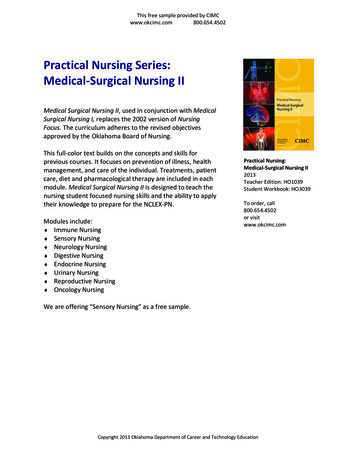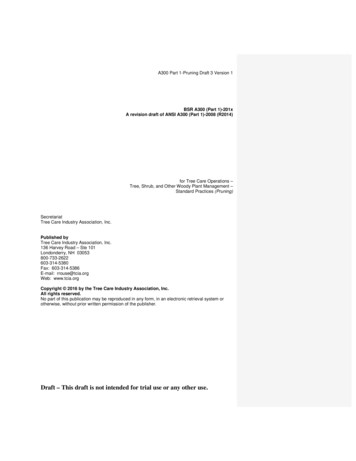Philosophy Of Nursing Katlyn Oldani Old Dominion
Running Head: PHILOSOPHY OF NURSING1Philosophy of NursingKatlyn OldaniOld Dominion University
PHILOSOPHY OF NURSING2Nursing is a profession that continuously involves growth and change in an individual. From thestart of one’s journey, the values and ethics of nursing should not only influence one’s practice, butoverall philosophy on well being for themselves and others. It is important to take a deeper look intowhat philosophy means and how one creates an individualized philosophy they can maintain throughouttheir career and life. Developing a philosophy is an important tool to guide one’s practice of patientcare.What is a Philosophy?Philosophy is defined as “a particular set of ideas about knowledge, truth, the nature andmeaning of life, etc.” and “a set of ideas about how to do something or how to live” (Merriam-Webster).Keeping this definition in mind, it is easy to understand the importance of having a set philosophy tohelp journey through life. A philosophy could be about a particular subject, or a person can develop onefor himself or herself. A philosophy can be in a mission statement or an overall idea about the purposeand direction of a person, subject, or organization.Philosophies of NursingThe nursing profession has an ever-changing, situational work environment; therefore, having aphilosophy is important for providing care. Nursing is very situational and having developed guidelinesare important tools to use when making decisions and guiding practice. To help develop thefundamentals of nursing, philosophies were created to describe important roles and expectations.Nightengale, Henderson, and Watson are important theorists who philosophies and ideas have guidednursing practice for many years (Kozier & Erb, 2012). Many organizations in nursing have also developedphilosophies that others can use as a reference. ANA states “Nursing is the protection, promotion, andoptimization of health and abilities, prevention of illness and injury, alleviation of suffering through thediagnosis and treatment of human response, and advocacy in the care of individuals, families,
PHILOSOPHY OF NURSING3communities, and populations” (ANA, 2014). This statement is the organization’s idea of who a nurse isand what their purpose is. It is a standard of excellence nurses can reference to develop their practice.The ANA’s statement is only one example of a philosophy of nursing, and most organizations have theirown that is slightly specific to their mission. These set philosophies can help nurses to develop their ownpersonal statements they can use in their practice.My Philosophy of NursingMy journey of nursing has educationally just started however there are many things that haveled me to this place. My past experiences have led me to develop a unique desire for nursing, and willalso influence my philosophy as a nurse. My role as a nurse will be to increase patient health through anexceptional level of care in correlation with communication, education, and valuing a person’s dignity. Iam a true believer in the importance of health as an overall state of well being. I will communicate andteach my patients the importance of mental, physical, and emotional health as interrelated parts thatwork together to impact the overall health. This holistic philosophy will guide me during my nursingjourney and in patient care. I think it is important to stress to patients how all aspects of their health areimportant to over well-being. I will use this philosophy in my practice and help educate patients onstaying physically, mentally, and emotionally healthy. I look forward to continuing my education in theseareas and how I can further promote these aspects of health. I will strive to maintain a level of patientdignity and treat each person with respect. This is important aspect of nursing because it will allow meto gain positive rapport and trust with my patients. Developing a strong level of communication with apatient can lead to increased care by having a better understanding of the patient.Evidence Based PracticeEvidence based practice is “clinical decision making based on the simultaneous use of the bestevidence, clinical expertise, and client’s values” (Kozier&Erb, 2012). Following this definition, as
PHILOSOPHY OF NURSING4evidence changes, so must practice. More and more research has been done compiling the importanceof nursing as a holistic profession. In an article regarding this subject, the author discusses theintegration of holistic nursing and medical nursing and the benefits it provides. There is clear evidencethat holistic nursing is the best was to integrate many different aspects of health, including the body,mind, and spirit into one progressive goal of healing and health for the whole person and body (Sharoff,2008). The American Holistic Nursing Association is a great resource for nurses with a holisticphilosophy. The AHNA’s website discusses their philosophy, education, ethic theories, self-care,communication, environment, cultural diversity, and the caring process (Sharoff, 2008). The informationprovided from these two sources, as well as many others, can guide nurses in their practice by provenevidence of what increases patient care and well being.Intuition Based PracticeNursing is one profession where every day is different and each situation is specific to thatindividual in a nursing setting. The differences in each unique situation require nurses to make decisionbased on each individual. In order to make the beset decision for the situation, it helps for nurses tohave guidelines for making decisions. Nurses can use their intuition in situations to help provide thebest care. Nurses can use guidelines such as Maslow’s Hierarchy of Needs and Erikson’s DevelopmentalStages to find out what can be done to increase the patient’s health. If nurses sense something else iswrong they can use effective communication to gain report with their patients and help determine anyunderlying sources of a problem. Physical, mental, and emotional health all work together and it isimportant for all three aspects to be functioning properly to ultimately increase health.Clinical ExperienceClinicals are excellent experiences for student nurses to develop their skills by working in a “reallife” situation. I have had the opportunity to complete hours at a local hospital and this time is an
PHILOSOPHY OF NURSING5invaluable opportunity for me to develop my practice. I used my philosophy of patient dignity of my roleas a student nurse while caring for my patients. Providing daily hygienic care to my individual patientsallowed me to spend some time with them, and increased their mood due to being refreshed. Thesebasic aspects of nursing care ultimately gave me the time to establish a relationship with my patient andgive them a sense of respect and dignity. Holistic nursing encompasses all aspects of physical, mental,and emotional health. In my clinical experience, it was important for me to portray this philosophy andteach my patients how important taking care of their whole self is. After gaining a positive relationshipwith my patient through effective communication and respect, I was able to help teach them about theideas and theories of holistic healing to find ways they can incorporate health into their daily lives.ConclusionPhilosophy has been and will continue to be an important aspect and driving force in nursingdue to the nature of care. It is important to have a deep understanding of the elements of nursing andthe different theories that play are role in providing patient care and increasing overall well-being. Thevalues of a nurse should be reflected in practice and everyday life, and by determining a philosophyspecific to the individual, it will help the nurse to consistently provide the best care to their patient.
PHILOSOPHY OF NURSING6ReferencesAmerican Holistic Nurses Association. (2014). Retrieved from www.ahna.org.American Nurses Association. (2014). Retrieved from www.nursingworld.org.Berman, A., & Snyder.S. (2012). Kozier & Erb’s fundamentals of nursing: concepts, process, and practice(9th ed.). Upper Saddle River, New Jersey: Pearson.Philosophy. (n.d.) In Merriam-Webster’s online dictionary (11th ed.). Retrieved osophySharoff, L. (2008). Holistic nursing and medical-surgical nursing: a natural integration. MEDSURGNursing, 17(3), 206-208.
fundamentals of nursing, philosophies were created to describe important roles and expectations. Nightengale, Henderson, and Watson are important theorists who philosophies and ideas have guided nursing practice for many years (Kozier & Erb, 2012). Many organizations in nursing have also d
for Nursing (69) Delaware Board of Nursing (12) District of Columbia Board of Nursing (75) Florida Board of Nursing (70) Georgia Board of Nursing (31) Guam Board of Nurse Examiners (87) Hawaii Board of Nursing (37) Idaho Board of Nursing (82) Illinois Board of Nursing (49) Indiana State Board of Nursing (48) Iowa Board of Nursing (60)
Nursing 214 Intro to Medical Surgical Nursing 1 (9 weeks) 4 Nursing 571 Foundations of Nursing Skills Lab 0.5 MAJOR REQUIREMENTS (2nd Semester) Nursing 222 Nursing Care of Children & Families (9 weeks) 3.5 Nursing 224 Beginning Medical Surgical Nursing II 5 Nursing 226 N
GNM BSC Nursing PBBSc Nursing MSC Nursing . of Nursing Excellence, NAAC Accredited Nursing College, Part of P.D.Hinduja Hospital and Medical Research Centre which is committed to “Quality Healthcare for all” P.D.Hinduja College of Nursing is . Medical-Surgical Nursing, Obstetrics & Gynecology Nursing,
(i) Medical Surgical Nursing a Cardio Vascular & Thoracic Nursing 75-81 b Critical Care Nursing 82-88 c Medical Surgical Nursing –Oncology Nursing 89-95 d Medical Surgical Nursing - Neurosciences Nursing 96-102 e Medical Surgical Nursing
Team Nursing Overview . Team Nursing . model is based on philosophy in which groups of professional and non-professional nursing personnel work together to identify, plan, implement and evaluate . Up to 4 - 5 pts Up to - 5 pts Certified Nursing Support . 4 . Roles and Responsibilities in Team and Functional Nursing .
Practical Nursing Series: Medical-Surgical Nursing II This free sample provided by CIMC www.okcimc.com 800.654.4502 Medical Surgical Nursing II, used in conjunction with Medical Surgical Nursing I, replaces the 2002 version of Nursing Focus. The curriculum adheres to the revised objectives approved by the Oklahoma Board of Nursing.
Diploma in Nursing (GNM) Duration: 3 Years Bachelor of Nursing Duration: 4 Years Post Basic B.Sc. Nursing Duration: 2 Years Master of Nursing Duration: 2 Years Specialisations: 1. Medical-Surgical Nursing 2. Obstetric & Gynaecological Nursing (OBG) 3. Child Health Nursing 4. Community Health Nursing
ANSI A300 standards are intended to guide work practices for the care of trees, palms, shrubs, and other woody landscape plants. They apply to arborists, horticulturists, landscape architects, and other professionals who provide for or supervise the management of these plants for property owners, property managers, businesses, government agencies, utilities, and others who use these services .























